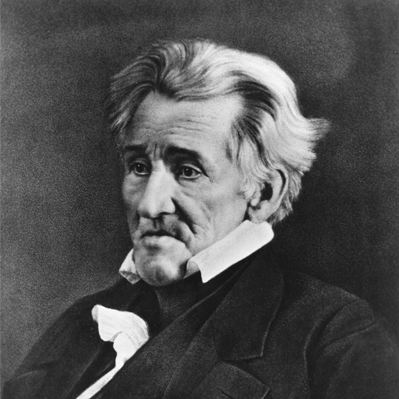
JACKSON
Andrew
7th president of the United States
Date of Birth: 15 March 1767
person_view.holiday: Consumer Rights Day
Date death: 8 June 1845
Age at the time of death: 78 years old
Zodiac sign: Pisces
Profession: President
Biography
Andrew Jackson
was an American soldier and statesman who served as the seventh president of the United States from 1829 to 1837. Before being elected to the presidency, Jackson gained fame as a general in the United States Army and served in both houses of the U.S. Congress. An expansionist president, Jackson sought to advance the rights of the "common man" against a "corrupt aristocracy" and to preserve the Union.
Born in the colonial Carolinas in the decade before the American Revolutionary War, Jackson became a frontier lawyer and married Rachel Donelson Robards. He served briefly in the United States House of Representatives and the United States Senate, representing Tennessee. After resigning, he served as a justice on the Tennessee Supreme Court from 1798 until 1804. Jackson purchased a property later known as The Hermitage, and became a wealthy, slaveowning planter. In 1801, he was appointed colonel of the Tennessee militia and was elected its commander the following year. He led troops during the Creek War of 1813–1814, winning the Battle of Horseshoe Bend. The subsequent Treaty of Fort Jackson required the Creek surrender of vast lands in present-day Alabama and Georgia. In the concurrent war against the British, Jackson's victory in 1815 at the Battle of New Orleans made him a national hero. Jackson then led U.S. forces in the First Seminole War, which led to the annexation of Florida from Spain. Jackson briefly served as Florida's first territorial governor before returning to the Senate. He ran for president in 1824, winning a plurality of the popular and electoral vote. As no candidate won an electoral majority, the House of Representatives elected John Quincy Adams in a contingent election. In reaction to the alleged "corrupt bargain" between Adams and Henry Clay and the ambitious agenda of President Adams, Jackson's supporters founded the Democratic Party.
Jackson ran again in 1828, defeating Adams in a landslide. Jackson faced the threat of secession by South Carolina over what opponents called the "Tariff of Abominations". The crisis was defused when the tariff was amended, and Jackson threatened the use of military force if South Carolina attempted to secede. In Congress, Henry Clay led the effort to reauthorize the Second Bank of the United States. Jackson, regarding the Bank as a corrupt institution that benefited the wealthy at the expense of ordinary Americans, vetoed the renewal of its charter. After a lengthy struggle, Jackson and his allies thoroughly dismantled the Bank. In 1835, Jackson became the only president to completely pay off the national debt, fulfilling a longtime goal. While Jackson pursued numerous reforms designed to eliminate waste and corruption, his presidency marked the beginning of the ascendancy of the party "spoils system" in American politics. In 1830, Jackson signed the Indian Removal Act, which forcibly relocated most members of the major tribes of the Southeast to Indian Territory. The relocation process dispossessed these nations of their land and resulted in widespread death and disease. Jackson opposed the abolitionist movement, which grew stronger in his second term. In foreign affairs, Jackson's administration concluded a "most favored nation" treaty with the United Kingdom, settled claims of damages against France from the Napoleonic Wars, and recognized the Republic of Texas. In January 1835, he survived the first assassination attempt on a sitting president.
In his retirement, Jackson remained active in Democratic Party politics, supporting the presidencies of Martin Van Buren and James K. Polk. Though fearful of its effects on the slavery debate, Jackson advocated the annexation of Texas, which was accomplished shortly before his death. Jackson has been widely revered in the United States as an advocate for democracy and the common man. Many of his actions proved divisive, garnering both fervent support and strong opposition from many in the country. His reputation has suffered since the 1970s, largely due to his role in Native American removal; however, surveys of historians and scholars have ranked Jackson favorably among U.S. presidents.
Early life and education
Andrew Jackson was born on March 15, 1767, in the Waxhaws region of the Carolinas. His parents were Scots-Irish colonists Andrew Jackson and his wife Elizabeth Hutchinson, Presbyterians who had emigrated from Ulster, Ireland, two years earlier. Jackson's father was born in Carrickfergus, County Antrim, around 1738. Jackson's parents lived in the village of Boneybefore, also in County Antrim. His paternal ancestors originated in Killingswold Grove, Yorkshire, England.
When they immigrated to North America in 1765, Jackson's parents’ first two children also came with them from Ireland, Hugh (born 1763) and Robert (born 1764). The family probably landed in Philadelphia. Most likely they traveled overland through the Appalachian Mountains to the Scots-Irish community in the Waxhaws, straddling the border between North and South Carolina. Jackson's father died in February 1767 at the age of 29, in a logging accident while clearing land, three weeks before his son Andrew was born. Jackson, his mother, and his brothers lived with Jackson's aunt and uncle in the Waxhaws region, and Jackson received schooling from two nearby priests.
Jackson's exact birthplace is unclear because of a lack of knowledge of his mother's actions immediately following her husband's funeral. The area was so remote that the border between North and South Carolina had not been officially surveyed. In 1824, Jackson wrote a letter saying he had been born on the plantation of his uncle James Crawford in Lancaster County, South Carolina. Jackson may have claimed to be a South Carolinian because the state was considering nullification of the Tariff of 1824, which he opposed. In the mid-1850s, second-hand evidence indicated that he might have been born at a different uncle's home in North Carolina. As a young boy, Jackson was easily offended and was considered something of a bully. He was, however, said to have taken a group of younger and weaker boys under his wing and been very kind to them.
Early career
Legal career and marriage
After the Revolutionary War, Jackson received a sporadic education in a local Waxhaw school. On bad terms with much of his extended family, he boarded with several different people. In 1781, he worked for a time as a saddle-maker, and eventually taught school. He apparently prospered in neither profession. In 1784, he left the Waxhaws region for Salisbury, North Carolina, where he studied law under attorney Spruce Macay. With the help of various lawyers, he was able to learn enough to qualify for the bar. In September 1787, Jackson was admitted to the North Carolina bar. Shortly thereafter, his friend John McNairy helped him get appointed to a vacant prosecutor position in the Western District of North Carolina, which would later become the state of Tennessee. During his travel west, Jackson bought his first slave, a woman who was older than him. In 1788, having been offended by fellow lawyer Waightstill Avery, Jackson fought his first duel. The duel ended with both men firing into the air, having made a secret agreement to do so before the engagement.
Jackson moved to the small frontier town of Nashville in 1788, where he lived as a boarder with Rachel Stockly Donelson, the widow of John Donelson. Here Jackson became acquainted with their daughter, Rachel Donelson Robards. The younger Rachel was in an unhappy marriage with Captain Lewis Robards; he was subject to fits of jealous rage. The two were separated in 1790. According to Jackson, he married Rachel after hearing that Robards had obtained a divorce. Her divorce had not been made final, making Rachel's marriage to Jackson bigamous and therefore invalid. After the divorce was officially completed, Rachel and Jackson remarried in 1794. To complicate matters further, evidence shows that Rachel had been living with Jackson and referred to herself as Mrs. Jackson before the petition for divorce was ever made. It was not uncommon on the frontier for relationships to be formed and dissolved unofficially, as long as they were recognized by the community.
Land speculation and early public career
In 1794, Jackson formed a partnership with fellow lawyer John Overton, dealing in claims for land reserved by treaty for the Cherokee and Chickasaw. Like many of their contemporaries, they dealt in such claims although the land was in Indian territory. Most of the transactions involved grants made under a 'land grab' act of 1783 that briefly opened Indian lands west of the Appalachians within North Carolina to claim by that state's residents. He was one of the three original investors who founded Memphis, Tennessee, in 1819.
After moving to Nashville, Jackson became a protege of William Blount, a friend of the Donelsons and one of the most powerful men in the territory. Jackson became attorney general in 1791, and he won election as a delegate to the Tennessee constitutional convention in 1796. When Tennessee achieved statehood that year, he was elected its only U.S. Representative. He was a member of the Democratic-Republican Party, the dominant party in Tennessee. As a representative, Jackson staunchly advocated for the rights of Tennesseans against Native American tribal interests. He strongly opposed the Jay Treaty and criticized George Washington for allegedly removing Democratic-Republicans from public office. Jackson joined several other Democratic-Republican congressmen in voting against a resolution of thanks for Washington, a vote that would later haunt him when he sought the presidency. In 1797, the state legislature elected him as U.S. senator. Jackson seldom participated in debate and found the job dissatisfying. He pronounced himself "disgusted with the administration" of President John Adams and resigned the following year without explanation. Upon returning home, with strong support from western Tennessee, he was elected to serve as a judge of the Tennessee Supreme Court at an annual salary of $600. Jackson's service as a judge is generally viewed as a success and earned him a reputation for honesty and good decision-making. Jackson resigned the judgeship in 1804. His official reason for resigning was ill health. He had been suffering financially from poor land ventures, and so it is also possible that he wanted to return full-time to his business interests.
After arriving in Tennessee, Jackson won the appointment of judge advocate of the Tennessee militia. In 1802, while serving on the Tennessee Supreme Court, he declared his candidacy for major general, or commander, of the Tennessee militia, a position voted on by the officers. At that time, most free men were members of the militia. The organizations, intended to be called up in case of armed conflicts, resembled large social clubs. Jackson saw it as a way to advance his stature. With strong support from western Tennessee, he tied with John Sevier with seventeen votes. Sevier was a popular Revolutionary War veteran and former governor, the recognized leader of politics in eastern Tennessee. On February 5, Governor Archibald Roane broke the tie in Jackson's favor. Jackson had also presented Roane with evidence of land fraud against Sevier. Subsequently, in 1803, when Sevier announced his intention to regain the governorship, Roane released the evidence. Jackson then published a newspaper article accusing Sevier of fraud and bribery. Sevier insulted Jackson in public, and the two nearly fought a duel over the matter. Despite the charges leveled against Sevier, he defeated Roane and continued to serve as governor until 1809.
Born in one day
person_view.holiday: Consumer Rights Day
.
Horoscope Pisces: horoscope for today, horoscope for tomorrow, horoscope for week, horoscope for month, horoscope for year.



















































